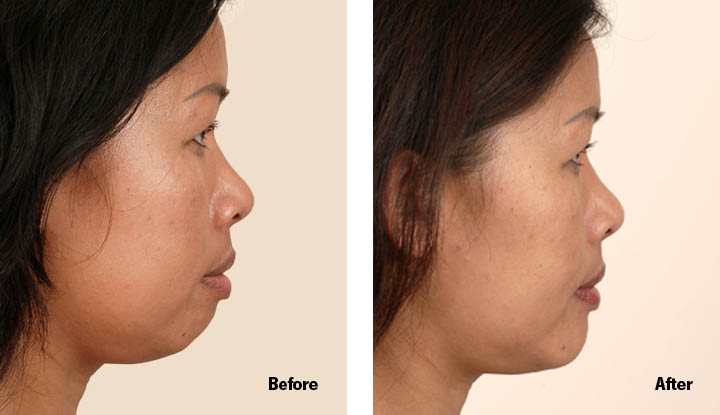A genioplasty is chin surgery to augment (make larger) or reshape your chin. A plastic surgeon may use an implant or reposition your own chin bone to change the shape of your chin.
Advertisement
Cleveland Clinic is a non-profit academic medical center. Advertising on our site helps support our mission. We do not endorse non-Cleveland Clinic products or services. Policy

Image content: This image is available to view online.
View image online (https://my.clevelandclinic.org/-/scassets/images/org/health/articles/genioplasty-chin-augmentation)
A genioplasty, or chin augmentation, is a type of chin surgery to enhance the size or shape of your chin. It helps your chin appear balanced with your other facial features. You might want a genioplasty to make your chin larger or more defined. The procedure can also reposition your chin if it’s recessed (too far back), protruding (too far forward) or misaligned.
Advertisement
Cleveland Clinic is a non-profit academic medical center. Advertising on our site helps support our mission. We do not endorse non-Cleveland Clinic products or services. Policy
While most people get a genioplasty for cosmetic reasons, some need the procedure to reconstruct their chin. Reconstructive surgery might be necessary if you have:
There are two types of genioplasty:
The best candidates for chin augmentation are people who:
Your healthcare provider will give you instructions on how to prepare for a genioplasty. They may do bloodwork or other tests to be sure this surgery is safe for you. Your provider may also perform imaging exams, such as X-rays, to examine your chin bone and plan your surgery. They might also take photographs of your chin and jawline before and after your surgery.
Advertisement
Before surgery, you may need to stop taking certain medications. Tell your provider if you take aspirin, anti-inflammatory drugs, herbal supplements or anticoagulants (blood thinners). If you smoke, you should quit smoking several weeks before the procedure.
Your surgery will vary depending on whether you get a chin implant or a sliding genioplasty. For either procedure, you receive some form of anesthesia. Most people get general anesthesia, but sometimes, your provider may recommend local anesthesia or sedation.
Both types of genioplasty require an incision (cut). In genioplasty, your surgeon makes an incision inside your mouth. For a chin implant, your surgeon can make the incision inside your mouth or hide it under your chin.
During chin implant surgery, your surgeon inserts the silicone implant. They’ll will make sure the implant is centered and properly aligned.
During a sliding genioplasty, your surgeon cuts part of your chin bone. They reposition the bone forward, backward or sideways to achieve the right chin shape. Your surgeon then secures the bone in place with plates and screws.
When they’re done, your surgeon closes the incision with dissolvable stitches. Sometimes, they put a bandage or wrap on your face to support your chin and reduce swelling. They may give you a dose of intravenous (through a vein in your arm) antibiotics to prevent infection.
Most people can go home the same day as their genioplasty. Your care team will watch you for a few hours as you recover. You’ll receive specific instructions about how to care for your incision once you get home.
Try not to touch or irritate your incision or stitches. Rinse your mouth out regularly to keep it clean. Your provider may give you a special oral rinse to prevent infection. Stick to liquids or very soft foods for a few days after your surgery. You can start eating a regular diet once your provider tells you it’s safe.
A chin augmentation can:
Although rare, a genioplasty may cause:
It’s important to take it easy after chin augmentation surgery. Avoid heavy lifting, bending or strenuous activity for at least a week. Depending on your job, you may need to stay home from work for a few days or weeks.
It’s normal to have some swelling and bruising for a few weeks after your procedure. If your chin hurts, your provider may recommend pain relievers. Cold compresses can relieve discomfort and swelling as your incision heals. Try to sleep with your head elevated above your heart, which can further reduce swelling in your face.
Advertisement
Contact your healthcare provider if you have:
Our faces say a lot about us. They often reveal when we’ve had a bad night’s sleep, or if we’re feeling happy or sad, confident or shy. If you don’t like how your chin looks, you might spend a lot of time hiding it. But it doesn’t have to be this way. Talk with your healthcare provider about your feelings. They can steer you toward the right therapies for you, whether it’s genioplasty or something else.
Advertisement

Sign up for our Health Essentials emails for expert guidance on nutrition, fitness, sleep, skin care and more.
Learn more about the Health Library and our editorial process.
Cleveland Clinic’s health articles are based on evidence-backed information and review by medical professionals to ensure accuracy, reliability and up-to-date clinical standards.
Cleveland Clinic’s health articles are based on evidence-backed information and review by medical professionals to ensure accuracy, reliability and up-to-date clinical standards.
Whether you need cosmetic or reconstructive plastic surgery, you’ll need skilled, detailed and compassionate providers. At Cleveland Clinic, we’re here to help.
